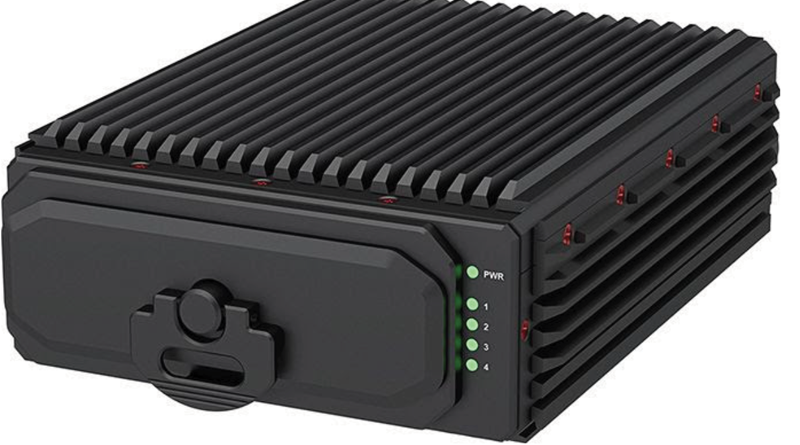General Micro Systems (GMS) Redefines Handheld, Removable Mass Storage with the New X9 Spider Storage Module for U.S. Military Applications
128TB of portable, high-reliability solid, state storage fits in the palm, perfect for battlefield artificial intelligence A.I. datasets or mobile sensor data recorders
General Micro Systems announced the launch of its rugged, military-focused X9 Spider Storage system intended for sensor data recorders, artificial intelligence A.I. datasets, “network” attached Storage, and data payload “sneaker net” portable data movement. As a critical component within GMS’ X9 Spider Thunderbolt™ 4 technology-based open distributed computing architecture (DCA), this X9 Storage includes a 4- or 8-drive removable cartridge supporting secure, industry-standard 2.5-inch or M.2 solid-state storage. The small form factor (SFF) system offers a massive 128TB (max) of removable storage capacity, CSfC or FIPS-140-2 secure encrypted SSDs, and up to 80Gbits/s of data I/O streaming.
The rugged, military-focused X9 Spider Storage system offers a massive 128TB (max) of removable storage capacity, CSfC or FIPS-140-2 secure encrypted SSDs, and up to 80Gbits/s of data I/O streaming.
“Next-generation AI, sensor fusion, and autonomous vehicle applications demand data capacities that far surpass traditional portable mass storage solutions,” said Ben Sharfi, CEO and chief architect of GMS. “The X9 Spider Storage module combines massive storage with over 5,000 mating cycles and ultra-fast Thunderbolt™ 4 In/Out ports inside fully sealed, ruggedized, and removable canister cartridges – the perfect choice to support harsh, demanding in-field data operations.” The drives can be configured in RAID array(s) for fault tolerance or data recorder striping and have advanced sanitization options for modern cybersecurity requirements.
Built to deliver an unparalleled portable storage solution, X9 Spider Storage uses proven high-cycle, high-reliability connectors for the canister and a miniature SFF system size to enable any vehicle, system, or personnel to move massive amounts of data between locations easily. As today’s military computing systems are essentially data collection and processing platforms – such as mission data transfer units, autonomous ground vehicles, unmanned aerial systems (UAS), and generative A.I. processors – storage solutions must meet significant data storage requirements while meeting size, weight, and power (SWaP) constraints. Also, the data “pipes” delivering data to/from the drives must be fast enough to keep up with modern SSD read/write speeds.
What makes X9 Storage unique and compelling is the amount of data carried in a single portable canister (up to 128TB), as well as the dual Thunderbolt™ 4 ports. An industry-standard interface jointly designed by Apple Computer and Intel, Thunderbolt 4 technology is a 40Gbits/s data “pipe” that carries multiple video streams, PCI Express data, 10Gbits/s networking, USB, and up to 100W of power. In X9 Storage, one Thunderbolt input port can be used for data reading/writing. In contrast, the second port can be used for daisy-chaining additional downstream X9 products—including one or more additional X9 Storage systems.
This creates unique architectures that expand a system’s storage “array” into many removable canisters, provide for fault tolerance and redundancy, or enable larger RAID arrays. The possibilities are limitless, all based on the X9 distributed computing architecture. Moreover, any COTS Thunderbolt device can be added to the system in a guaranteed plug-and-play fashion, and a system host CPU immediately recognizes each.
Cybersecurity features in X9 Storage protect data in several ways, easily integrating X9 Storage into a broader system architecture. FIPS-140-2 and CSfC drives support NSA-level encryption, host-level TPM, and critical handling to provide security root-of-trust authentication. Anti-tamper sensors can interface with GMS SecureDNA™ at the drive, system, and CPU level for whole-system sanitization. Other custom features are available.
The X9 Spider Distributed System Advantage
The X9 Spider’s modular, scalable, and distributed architecture reduces the development barriers to rugged high-performance computing, high-definition video, sensor processing, A.I., battlefield edge processing, Storage, display, and I/O. Housed within small, rugged enclosures with uncompromised performance per dollar per watt, all X9 SPIDER products are modular, expandable, and scalable. The X9 Spider family supports Thunderbolt 4 technology and our patented LightBolt™ 40 Gbps connections in copper or fiber, with optional 100W per-port power for up-/down-stream sensors and system expansion.
“If you can’t fit a rackmount server with drives, the X9 Storage system is the battlefield choice. Secure CSfC or FIPS drives, flexible SSD options with RAID, high-speed box-level interconnects, and exceptional fault tolerance make X9 Storage the only choice for on-the-battlefield, deployed high-density embedded Storage,” Sharif said. “These modules greatly enhance the capacity and reliability of data movement across the battlefield, giving system designers what they need to meet performance and environmental requirements.”

